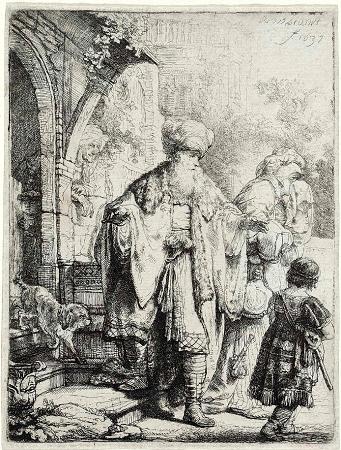Abraham. Abraham is the common patriarch of Christianity, Islam, Judaism, and other religions. In Judaism, he is the founding father of the covenant of the pieces, the special relationship between the Hebrews and God; in Christianity, he is the prototype of all believers, Jewish or Gentile; and in Islam he is seen as a link in the chain of prophets that begins with Adam and culminates in Muhammad. The narrative in the Book of Genesis revolves around the themes of posterity and land. Abraham is called by God to leave the house of his father Terah and settle in the land originally given to Canaan but which God now promises to Abraham and his progeny. Various candidates are put forward who might inherit the land after Abraham; and, while promises are made to Ishmael about founding a great nation, Isaac, Abraham's son by his half-sister Sarah, inherits God's promises to Abraham. Abraham purchases a tomb at Hebron to be Sarah's grave, thus establishing his right to the land; and, in the second generation, his heir Isaac is married to a woman from his own kin, thus ruling the Canaanites out of any inheritance. Abraham later marries Keturah and has six more sons; but, on his death, when he is buried beside Sarah, it is Isaac who receives all Abraham's goods, while the other sons receive only gifts. The Abraham story cannot be definitively related to any specific time, and it is widely agreed that the patriarchal age, along with the exodus and the period of the judges, is a late literary construct that does not relate to any period in actual history. A common hypothesis among scholars is that it was composed in the early Persian period as a result of tensions between Jewish landowners who had stayed in Judah during the Babylonian captivity and traced their right to the land through their father Abraham, and the returning exiles who based their counter-claim on Moses and the Exodus tradition. Terah, the ninth in descent from Noah, was the father of three sons: Abram, Nahor, and Haran. The entire family, including grandchildren, lived in Ur of the Chaldees. According to a midrash, Abram worked in Terah's idol shop in his youth. Haran was the father of Lot, and thus Lot was Abram's nephew. Haran died in his native city, Ur of the Chaldees. Abram married Sarah, who was barren. Terah, with Abram, Sarai, and Lot, then departed for Canaan, but settled in a place named Haran, where Terah died at the age of 205. God had told Abram to leave his country and kindred and go to a land that he would show him, and promised to make of him a great nation, bless him, make his name great, bless them that bless him, and curse them who may curse him. Abram was 75 years old when he left Haran with his wife Sarai, his nephew Lot, and the substance and souls that they had acquired, and traveled to Shechem in Canaan. There was a severe famine in the land of Canaan, so that Abram and Lot and their households, traveled to Egypt. On the way Abram told Sarai to say that she was his sister, so that the Egyptians would not kill him. When they entered Egypt, the Pharaoh's officials praised Sarai's beauty to Pharaoh, and they took her into the palace and gave Abram goods in exchange. God afflicted Pharaoh and his household with plagues, which led Pharaoh to try to find out what was wrong. Upon discovering that Sarai was a married woman, Pharaoh demanded that Abram and Sarai leave. Main article: Abraham and Lot's conflict When they came back to the Bethel and Hai area, Abram's and Lot's sizable herds occupied the same pastures. This became a problem for the herdsmen who were assigned to each family's cattle. The conflicts between herdsmen had become so troublesome that Abram suggested that Lot choose a separate area, either on the left hand or on the right hand, that there be no conflict amongst brethren. Lot chose to go eastward to the plain of Jordan where the land was well watered everywhere as far as Zoar, and he dwelled in the cities of the plain toward Sodom. Abram went south to Hebron and settled in the plain of Mamre, where he built another altar to worship God. Main article: Battle of Siddim During the rebellion of the Jordan River cities against Elam, Abram's nephew, Lot, was taken prisoner along with his entire household by the invading Elamite forces. The Elamite army came to collect the spoils of war, after having just defeated the king of Sodom's armies. Lot and his family, at the time, were settled on the outskirts of the Kingdom of Sodom which made them a visible target. One person who escaped capture came and told Abram what happened.
more...













